Eerdmans Biblical Interpretation Collection (13 vols.)
Overview
This collection gathers an engaging variety of scholarly texts that tackle important issues in biblical interpretation. Gain a helpful overview of hermeneutical and interpretive thought, learn about the history of biblical interpretation from ancient times through the Reformation, explore typology, and dive into a Festschrift honoring one of twentieth-century biblical hermeneutics’ most prominent figures, Anthony Thiselton. You can also investigate taking a historical-critical approach to the Bible in the postmodern era, learn about the major literary forms found in Scripture, gain insights on approaching difficult passages, learn how historical exegetes approached these “dark passages,” and much more.
The Logos edition of Eerdmans Biblical Interpretation Collection is designed to enhance and accelerate your study. These fully indexed texts enable near-instant search results for words, people, places, and ideas, while Scripture references appear on mouseover in your preferred translation. Find what other authors, scholars, and theologians have to say about historical exegesis, typology, interpretive theory and hermeneutics, literary forms in the Bible, and much more. Logos’ tablet and mobile apps let you take your study wherever you go. With the most efficient and comprehensive research tools all in one place, you can expand your study with just a few clicks.
Get more books at a bigger discount when you order the Eerdmans Bible Reference Bundle!

- Tackles tough issues in biblical hermeneutics
- Provides a thorough history of biblical interpretation through the Reformation
- Includes a Festschrift in honor of Anthony Thiselton
- Offers an exploration of typological interpretation
- Title: Eerdmans Biblical Interpretation Collection
- Publisher: Eerdmans
- Volumes: 13
- Pages: 3,816
- The Word of God for the People of God: An Entryway to the Theological Interpretation of Scripture by J. Todd Billings
- Typos: The Typological Interpretation of the Old Testament in the New by Leonhard Goppelt
- Hermeneutics as a Theory of Understanding by Petr Pokorný
- Hermeneutics: An Introduction to Interpretative Theory by Stanley E. Porter and Jason Robinson
- Is Scripture Still Holy?: Coming of Age with the New Testament by A. E. Harvey
- A History of Biblical Interpretation, vol. 1 edited by Duane F. Watson and Alan J. Hauser
- A History of Biblical Interpretation, vol. 2 edited by Duane F. Watson and Alan J. Hauser
- Making Sense of the Bible: Literary Type as an Approach to Understanding by Marshall D. Johnson
- Horizons in Hermeneutics edited by Stanley E. Porter and Matthew R. Malcolm
- Sacred Word, Broken Word: Biblical Authority and the Dark Side of Scripture by Kenton L. Sparks
- Reading the Bible with the Dead by John L. Thompson
- Captive to the Word of God by Miroslav Volf
- The Bible after Babel: Historical Criticism in a Postmodern Age by John J. Collins
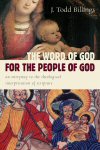
In this volume, J. Todd Billings provides a straightforward entryway for students and pastors to understand why theological interpretation matters, and how it can be done. A solid, constructive theological work, The Word of God for the People of God presents a distinctive Trinitarian, participatory approach toward reading Scripture as the church. Billings’ accessible, yet substantial argument for a theological hermeneutic is rooted in a historic vision of the practice of scriptural interpretation, while engaging a wide range of contemporary issues. It includes several exegetical examples that apply to concrete Christian ministry situations.
This roadmap through the field of theological interpretation of Scripture is a feast for the mind—and for the edification of the church.
—Kevin Vanhoozer, research professor of systematic theology, Wheaton College Graduate School
Billings is a sure-footed, reliable, and winsome guide to the general issues involved in theological interpretation.
—Walter Moberly, professor in the Department of Theology and Religion, Durham University
This is good work! I found myself saying ‘Amen!’ repeatedly as I read through the text. This wise and timely book will guide preachers and worship leaders in the service of the Word for the life and mission of the church.
—Michael Pasquarello III, Granger E. and Anna A. Fisher Professor of Preaching, Asbury Theological Seminary
Simply marvelous. . . . A major book, The Word of God for the People of God covers a wide range of themes—and covers all of them well.
—Matthew J. Levering, professor of theology, University of Dayton
In The Word of God for the People of God, Todd Billings gets to the core of the issues and states them with great clarity and firmness of line.
—John Webster, chair of systematic theology King’s College, Aberdeen
J. Todd Billings is Gordon H. Girod Research Professor of Reformed Theology at Western Theological Seminary, Holland, Michigan, and an ordained minister in the Reformed Church in America. He is also the author of Calvin, Participation, and the Gift, for which he won a 2009 Templeton Award for Theological Promise.
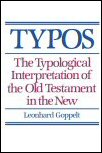
In this valuable text, Leonhard Goppelt examines typology and typological interpretation of the Bible. He explores its various definitions, and looks at typology in Palestinian Judaism, Hellenistic Judaism, the New Testament, apocalyticism, and Paul. Goppelt also gives a skilful analysis of the nature of Old Testament typology in the New Testament.
Leonhard Goppelt was a German theologian and New Testament scholar.
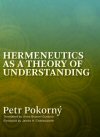
Walk with Petr Pokorný in and around his beloved field of hermeneutics as he explores a number of basic issues in understanding—from language in general, to the interpretation of the Bible in particular. Pokorný first addresses the world of language, showing the importance of understanding language thoroughly in terms of its vocabulary, syntax, and pragmatics, while keeping a keen eye open for metaphor and myth. Next he focuses on text, examining its graphic character, its misuse, and its silence—or its inability to answer questions posed to it. The third stop on Pokorný’s tour—methods of interpretation—looks at translation, rhetorical criticism, and historical methodologies of interpretation. In the final segment of his hermeneutical journey, Pokorný examines the nature of interpretation itself, celebrating especially its capacity to bridge the gap—or even the abyss—that divides the world of the text and the lived world of the reader, creating a dialogue between the two that can overcome the silence of the written word.
Why should an ethicist or moral theologian read this book? Because it is a ‘theory of understanding.’ Pokorný understands hermeneutics as personal engagement with a text that communicates from another historical age into our time, and its interpretation for ourselves and our world. It is historical understanding, with its origins in the past, its present meaning, and its guidance for the future. Not only explanation is involved but also motivation. The whole book expounds this theme, leading to chapter 5, ‘Interpretation’ where it reaches its climax.
—Charles C. West, professor emeritus, Princeton Theological Seminary
What is ‘hermeneutics,’ and what are the best methods for discerning the eternal in the ephemeral or God’s Word in scriptural words? To supply answers, Pokorný has crafted this wonderful and deeply inspiring book. . . . He blends together disciplines—philosophy, philology, phenomenology, and theology—that tend to shed each other like oil and water. . . . Pokorný shows how two worlds, our own and the authors’ world, merge in ways that transcend finite methodologies.
—James H. Charlesworth, George L. Collord Professor of New Testament Language and Literature, Princeton Theological Seminary
This little gem of a book places hermeneutics in its original context of biblical interpretation and so renders it both intelligible and available to wider philosophical enquiry. Petr Pokorný combines superb theological scholarship with philosophical understanding and the skills of an accomplished narrator. The result is a book that can both delight a scholar and serve as a text for a course in hermeneutics. . . A dashing good read!
—Erazim Kohák, professor emeritus, Academy of Sciences of the Czech Republic
Petr Pokorný is director of the Centre for Biblical Studies, Academy of Sciences of the Czech Republic and Charles University, Prague. He is also coeditor of Jesus Research: An International Perspective.
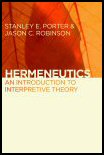
In this concentrated, intelligible, and useful introductory volume Stanley Porter and Jason Robinson give a splendid overview of hermeneutical and interpretive thought. Neither an all-inclusive survey that moves too quickly nor a specialized volume on a single, narrow topic, Porter and Robinson’s Hermeneutics provides critical analysis of major movements and figures in hermeneutics and interpretive theory in the modern era—from Schleiermacher and Heidegger to Thiselton and Culpepper—showing especially how these interpreters and their movements have impacted biblical and theological study.
We have needed a book like this for some time. It not only traces the philosophical issues and major figures but does so concisely and readably. This is a must-read for college and seminary classes as well as for anyone who wants to be grounded in the theoretical issues behind the process of interpreting texts.
—Grant Osborne, professor of New Testament, Trinity Evangelical Divinity School
Even seasoned students of hermeneutics seldom get a detailed overview of the discipline's most influential thinkers of the last two hundred years in a connected, chronological, descriptive, and evaluative analysis. Stan Porter—already well known for his prolific writing, especially in Greek linguistics and hermeneutical theory—here teams up with his former student Jason Robinson to provide such a volume. This is a text that will help readers with significant grounding in the discipline to connect many dots that they otherwise might never have realized form coherent patterns. Warmly to be welcomed.
—Craig L. Blomberg, distinguished professor of New Testament, Denver Seminary
Stanley Porter and Jason Robinson have written no ordinary book on hermeneutics. Their survey of the best thinking on the subject is a masterpiece. Here is the book for those who find hermeneutical theory mysterious and baffling.
—Craig A. Evans, Payzant Distinguished Professor of New Testament, Acadia Divinity College
Stanley Porter is president, dean, and professor of New Testament at McMaster Divinity College in Hamilton, Ontario.
Jason Robinsonis assistant professor in contemporary studies at Wilfrid Laurier University in Brantford, Ontario, and coeditor of Philosophical Apprenticeships: Contemporary Continental Philosophy in Canada.
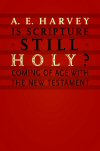
In this volume, A. E. Harvey asks: is the notion of Holy Scripture still credible? In particular, in the light of modern critical study and postmodern literary theory, does the New Testament still qualify as a “holy” book? Arguing that the New Testament must continually subject its credentials to examination for historical reliability, internal consistency, and general plausibility, Harvey tests the Bible’s historical credibility and plausibility in seven concise chapters. In dialogue with historical criticism, he compares the New Testament to other ancient documents, examines its presentation of Jesus, and considers the New Testament’s validity as a moral guide in the twenty-first century. Harvey’s careful examination leads him to conclude that a good case can still be made for the New Testament’s authority and “holiness,” subject to continual reassessment in the light of further advances in understanding and criticism.
This is a brilliant book. Anthony Harvey shows how thinking historically has changed our perceptions of scriptural authority, and he draws on his immense learning, lightly worn, to suggest how the Bible can inform and inspire Christians today. . . . His sane, sober, and lucid grappling with contemporary problems leaves readers free to make up their own minds, armed with fresh considerations. It cannot be too strongly recommended.
—Robert Morgan, lecturer in New Testament theology, Linacre College, Oxford
Can we embrace a modern critical approach to the New Testament and yet still regard it as ‘Holy Scripture’? Anthony Harvey shows that the New Testament, when interrogated critically, is much more reliable and inspiring than many scholars think.
—John Barton, Oriel and Laing Professor of the Interpretation of the Holy Scripture, University of Oxford
A timely and important book. With the grace, elegance, and profound but lightly worn scholarship that illuminate all of his writings, Harvey tackles head-on a subject of increasing centrality to theologians and New Testament scholars: how historical—and therefore authoritatively ‘holy’—are the narratives and teachings about Jesus’ ministry as recorded in the Gospels and by Paul? . . . Jews and Christians, believers and skeptics alike, will find these essays enlightening and of enormous value.
—David J. Goldberg, rabbi emeritus, Liberal Jewish Synagogue, London
A. E. Harvey is emeritus canon of Westminster, a fellow of the George Bell Institute, and former lecturer in theology at the University of Oxford. His other books include By What Authority? The Churches and Social Concern and A Companion to the New Testament.
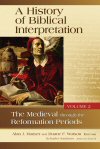
At first glance, it may seem strange that after more than two thousand years of biblical interpretation there are still major disagreements among biblical scholars about what the Jewish and Christian Scriptures say, and about how one is to read and understand them. Yet the range of interpretive approaches now available is the result both of the richness of the biblical texts themselves and of differences in the worldviews of the communities and individuals who have sought to make the Scriptures relevant to their own time and place. A History of Biblical Interpretation provides detailed and extensive studies of the interpretation of the Scriptures by Jewish and Christian writers throughout the ages. Written by internationally renowned scholars, this multi-volume work comprehensively treats the many different methods of interpretation, the many important interpreters who have written in various eras, and the many key issues that have surfaced repeatedly over the long course of biblical interpretation.
This first volume of A History of Biblical Interpretation explores interpreters and their methods in the ancient period, from the very earliest stages to the time when the canons of Judaism and Christianity gained general acceptance. The first part of the book concentrates on the use of the Scriptures within Judaism. Chapters examine inner-biblical exegesis in the Tanak, the development of the Septuagint, the exegetical approach of Philo of Alexandria, biblical interpretation in the Dead Sea Scrolls and the Targumim, the nature of rabbinic midrash, the stabilization of the Hebrew Bible, and the interpretation of the Bible in the Jewish Apocrypha and Pseudepigrapha. The second part of the book probes themes specific to Christian interpretation of the biblical texts. Chapters discuss how Israel’s Scriptures are used in the New Testament writings, the hermeneutical approaches of the Apostolic Fathers and the Apologists, Alexandrian and Antiochene exegesis, the contributions of Jerome and Augustine, the formation of the New Testament canon, and the interpretation of Scripture in the New Testament Apocrypha and Gnostic writings. This volume also includes a substantial introduction by the editors, giving readers a broad overview of the primary issues and features of ancient biblical interpretation and a means of sampling the ways in which the key figures, schools of interpretation, and issues discussed interweave and contrast with each other.
Biblical interpretation began even before the texts came to be written down. This volume leads readers from those early beginnings through the different stages of the fascinating history of inner-biblical exegesis up to the stabilization of the Tanak, and then further through to the writings of the New Testament and early Christianity. Every step is unfolded in thoroughgoing chapters by specialists who always keep in view the context of the history of biblical interpretation as a whole. The editors are to be congratulated on this very useful, even eye-opening combination of studies that are usually dealt with separately. Readers can look forward to future volumes continuing the discussion of biblical interpretation up through the twentieth century.
—Rolf Rendtorff, emeritus professor of Old Testament, University of Heidelberg
Hauser and Watson offer a fine collection of essays that provides, with minimal overlap, a balanced, well-informed understanding of both the context in which the Bible emerged and the stabilization of biblical traditions into a fixed canon.
—Catholic Biblical Quarterly
Duane F. Watson is professor of New Testament studies at Malone College, Canton, Ohio. He is also the author of Invention, Arrangement, and Style: Rhetorical Criticism of Jude and 2 Peter, editor of Persuasive Artistry: Studies in New Testament Rhetoric, and coauthor of Rhetorical Criticism of the Bible: A Comprehensive Bibliography with Notes on History and Method.
Alan J. Hauser is professor of biblical studies at Appalachian State University, Boone, North Carolina. He is also coeditor of Art and Meaning: Rhetoric in Biblical Literature and coauthor of From Carmel to Horeb: Elijah in Crisis and Rhetorical Criticism of the Bible: A Comprehensive Bibliography with Notes on History and Method.
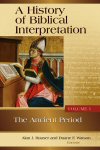
This second installment of A History of Biblical Interpretation contains essays by 15 noted scholars discussing major methods, movements, and interpreters in the Jewish and Christian communities from the beginning of the Middle Ages until the end of the sixteenth-century Reformation. The authors examine themes such as the variety of interpretive developments within Judaism during this period, the monumental work of Rashi and his followers, the achievements of the Carolingian era, and the later scholastic developments within the universities, beginning in the twelfth century. Included are bibliographical references for even deeper study.
Duane F. Watson is professor of New Testament studies at Malone College, Canton, Ohio. He is also the author of Invention, Arrangement, and Style: Rhetorical Criticism of Jude and 2 Peter, editor of Persuasive Artistry: Studies in New Testament Rhetoric, and coauthor of Rhetorical Criticism of the Bible: A Comprehensive Bibliography with Notes on History and Method.
Alan J. Hauser is professor of biblical studies at Appalachian State University, Boone, North Carolina. He is also coeditor of Art and Meaning: Rhetoric in Biblical Literature and coauthor of From Carmel to Horeb: Elijah in Crisis and Rhetorical Criticism of the Bible: A Comprehensive Bibliography with Notes on History and Method.
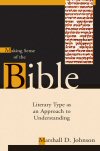
No book in the Western world has evoked more diverse interpretations than the Bible. One reason for this multiplicity of interpretation is the vast historical gap lying between the writing of the Scriptures and our own time. Can ordinary people today really make sense of this body of ancient literature? In Making Sense of the Bible, Marshall Johnson gives readers the tools needed to better understand Scripture by teaching them to recognize and handle the diverse kinds of literature that make up the Bible. Focusing on the eight major literary forms in the Bible—wisdom literature, liturgical materials, quasi-historical material, prophetic writings, collections of laws and precepts, apocalyptic literature, letters, and Gospels—Johnson describes each form’s central features and gives readers a sense of what to expect from each one and how to approach it. In addition, helpful appendixes discuss the forms of ancient Hebrew poetry, highlight the major literary types in biblical books, and provide suggestions for further reading.
This is a superb introduction to the Bible and its various literary types. Marshall Johnson is a sure and careful guide whose splendid clarity helpfully exposes both the diversity of the biblical documents as well as their common emphases. Readers will find this brief but wide-ranging book full of wise, practical advice.
—Dale C. Allison Jr., research scholar, Saint Paul School of Theology
For the most part, literary typology as an instrument of interpretation has been the province of academics. In this brief volume, Johnson shows remarkable success in broadening that use to a wide, nonacademic audience. . . . This eminently sensible and attractively written book deserves a broad audience. Highly recommended.
—Library Journal
A no-nonsense guide to understanding the Bible. . . . Consider it for your parish library; it’s brief, but helpful.
—Currents in Theology & Mission
Marshall D. Johnson, former director of Fortress Press, was involved in teaching and publishing in the area of biblical studies for several decades. He had a doctorate in biblical studies from Union Seminary, New York, and was a Fulbright lecturer and researcher at the University of Bergen, Norway. He is also the author of The Purpose of the Biblical Genealogies.
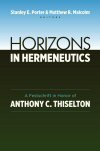
From essays that focus on the horizon of the text to essays that consider the horizon of the twenty-first century church, this collection edited by Matthew R. Malcolm and Stanley E. Porter invites reflection on the illumination that hermeneutical awareness brings to biblical interpretation. This Festschrift in honor of Anthony C. Thiselton aims to consider, exemplify, and build upon his insights in philosophical hermeneutics and biblical studies, particularly in relation to Paul and his writings.
Contributors:
- John Goldingay
- Robert Morgan
- Mark L. Y. Chan
- Richard S. Briggs
- James D. G. Dunn
- David Parris
- Richard H. Bell
- Tom Greggs
- Stephen Fowl
- John B. Thompson
For Anthony Thiselton, longtime professor of New Testament interpretation in Sheffield and Nottingham and prodigious and profound author and thinker, not to receive a Festschrift would be a grave injustice. Stanley Porter and Matthew Malcolm have not only honored Thiselton appropriately with this learned anthology of essays; they have also collected a series of first-rate studies covering the hermeneutic waterfront systematically and with reference to all of Thiselton's main interests. This is a special gift, with something for almost everyone in the church and the academy.
—Craig L. Blomberg, distinguished professor of New Testament, Denver Seminary
There are some heavyweight contributors and some heavyweight contributions in this collection of essays. They range from constructive engagement with the work of A. C. Thiselton, through surveys of current issues in theological hermeneutics, to developments of themes and ideas taken from Thiselton’s work. This is a stimulating and informative collection and a worthy tribute to what one contributor calls ‘the prince of present-day hermeneuts.’
—John Rogerson, emeritus professor of biblical studies, University of Sheffield
Professor Thiselton has always made hermeneutics a relevant subject for all training for ministry. This important collection of essays, exploring Old Testament and New Testament texts as well as theory, takes the conversation further. Anyone concerned about how the church interprets the Bible will want to read and gain from the rich array of contributions in this volume.
—Dennis Stamps, rector, St. Nicholas Parish, Harpenden, Great Britain
Stanley E. Porter is president, dean, and professor of New Testament at McMaster Divinity College in Hamilton, Ontario.
Matthew R. Malcolm lectures in Greek and New Testament at Trinity Theological College in Perth, Australia.
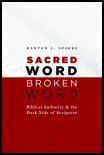
The Bible is a religious masterpiece, casting a profound vision for the healing of humanity through the power of divine love, grace, and forgiveness. But the Bible also contains “dark texts” that challenge our ethical imagination. How can one book speak of loving our enemies and also speak of slaughtering Canaanites? Why does a book that preaches the equality of all people—male and female, slave and free, Greek and Jew—also include laws that permit God’s people to trade in slaves and to persecute those of a different faiths or ethnicities? In Sacred Word, Broken Word, Kenton Sparks argues that the “dark side” of Scripture is not an illusion. Rather, these dark texts remind us that all human beings, including the biblical authors, stand in need of God’s redemptive solution in Jesus Christ.
Increasingly readers of the Bible are wondering aloud how they are to deal with such moral problems as the apparent divine approval of slavery and genocide. In this volume Kent Sparks invites Christians of whatever theological persuasion to engage with Scripture as God's authoritative Word. He voices his own problems with the ‘hard texts,’ warns against trivializing them, and looks for a possible positive way forward. This is a book to be taken seriously and read sympathetically, for the problems discussed are very real, and a candid conversation about them must be allowed to take place if Christians are to speak credibly in the contemporary world.
—I. Howard Marshall, professor emeritus of New Testament exegesis, University of Aberdeen, Scotland
Kent Sparks addresses the crucial and often painful question that I hear people asking around the world—from seminary students to their professors, from spiritual seekers to seasoned pastors, from ex-believers to new believers: What do we do about the Bible’s dark passages, the places that justify genocide or conflict with one another or can’t be squared with scientific data? Sparks doesn't follow the typical all-or-nothing responses to either left or right, but offers an honest, humble, creative, faithful, and robust approach to Scripture that presents it as part of God’s good-but-broken creation that is being redeemed in Christ. Highly recommended.
—Brian D. McClaren, author of A New Kind of Christianity
Incisive and honest, sophisticated yet clear, this volume will prove to be of immense value to those who wrestle with the nature of Scripture. Sparks illuminates a number of troubling and complex issues, and his readers will find their thoughts moving in new and promising directions.
—Dale C. Allison Jr., Errett M. Grable Professor of New Testament Exegesis and Early Christianity, Pittsburgh Theological Seminary
The moral problems of the Old Testament, including what justice means, how peace can be gained, and how love is to be known, can be examined from a number of angles. . . . The only acceptable approaches are those that struggle with the text as Scripture, as God's Word, and seek to find in that text what God might be saying to us today. Sacred Word, Broken Word is among the angels in pursuing this type of approach. Not all will agree, but I pray that this book will ignite a conversation about how to read the Bible better.
—Scot McKnight, professor of New Testament, Northern Baptist Theological Seminary
Sparks sets a new benchmark for work on the theological and philosophical reception of Scripture. Written with elegance, this is a book of seasoned scholarship that is accessible, spiritually sensitive, constructive, and provocative. Above all it is written from a heart attuned to the depths of human suffering and misery.
—William J. Abraham, Albert Cook Outler Professor of Wesley Studies, Perkins Theological Seminary, Southern Methodist University
Kenton L. Sparks is professor of biblical studies at Eastern University, St. Davids, Pennsylvania. His previous books include Ancient Texts for the Study of the Hebrew Bible and God’s Word in Human Words.
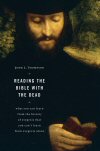
Many Christians would describe themselves as serious and regular readers of the Bible. Yet, if we are honest, most of us have a tendency to stick with the parts of the Bible that we understand or are comforted by, leaving vast tracts of Scripture unexplored. Even when following a guide, we may never reach into the Bible’s less-traveled regions—passages marked by violence, tragedy, offense, or obscurity. What our modern minds shy away from, however, ancient, medieval, and Reformation commentators dove into. In fact, their writings often display strikingly contemporary interests and sensitivities to the meaning and moral implications of the Bible’s difficult narratives. John L. Thompson here presents nine case studies in the history of exegesis—including the stories of Hagar and Jephthah’s daughter, the imprecatory psalms, and texts that address domestic relations, particularly divorce—in order to demonstrate the valuable insights into Scripture that we can gain not only from what individual commentators say but from fifteen centuries’ cumulative witness to the meaning of Scripture in the life of the church.
It is a peculiar conceit of modernity that we are the first to recognize the presence of puzzling, offensive texts in the Bible. John Thompson punctures that illusion and offers a fascinating survey of the diverse ways in which premodern interpreters struggled—for better and for worse—with some of the same texts that trouble us today. Reading the Bible with the Dead contains a treasure trove of provocative insights. The clarity of Thompson’s exposition is exemplary, and his evaluations are wise and balanced. The ‘Finding Guide to English Translations of Commentary Literature Written before 1600’ will be of great value to students and pastors who want to pursue this conversation more deeply.
—Richard B. Hays, George Washington Ivey Professor of New Testament, Duke Divinity School
Combining mature scholarship with an engaging style, John Thompson helps us to peer over the shoulders of saints of the past as we read the Bible today, especially some of its difficult texts. In doing so, he shows that serious study of Holy Scripture requires more than the latest Bible translation in one hand and the latest commentary in the other. An invaluable guide for all pastors and teachers of God’s Word.
—Timothy George, dean of Beeson Divinity School, Samford University
John Thompson is well known for his fascinating scholarly studies of the history of exegesis, particularly concerning some of the more challenging biblical texts on issues of gender and violence that lectionaries often skip. . . . In this clear and user-friendly book Thompson melds modern questions with patristic, medieval, and Reformation-era questionings about hard-to handle biblical stories and injunctions, from Hagar and Jephthah’s daughter to the psalms of imprecation and Pauline strictures on men’s hair and women’s public speaking. While making no claims to exhaustive treatment of any text, Thompson provides twenty-first-century readers with a rich spectrum of interpretation by pre-Enlightenment exegetes.
—Elsie McKee, Archibald Alexander Professor of Reformation Studies and the History of Worship, Princeton Theological Seminary
Thompson’s book provides an exceptionally incisive and courageous example of reading uncomfortable biblical texts through a history of the reading of those texts. The fruit it bears is faithful wisdom, the kind of reading we need most.
—Mark Labberton, senior pastor, First Presbyterian Church of Berkeley
A bold encounter with the ‘texts of terror.’ . . . Will be of profound interest to any scholar of the history of biblical interpretation or of feminist questions and uses of Scripture.
—Kathryn Greene-McCreight, assistant rector, St. John's Episcopal Church, New Haven, Connecticut
John L. Thompson is professor of historical theology and Gaylen & Susan Byker Professor of Reformed Theology at Fuller Theological Seminary.
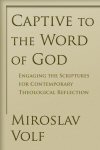
In Captive to the Word of God, eminent theologian Miroslav Volf invites readers to dip with him into the deep well of Scripture—to look over his shoulder as he engages actively with the Bible, which, as he notes, is at once a sacred text, a witness to Jesus Christ, and the site of God’s self-revelation for the sake of humanity’s salvation. After a probing explanation of how and why he uses Scripture to shape theological thought, Volf applies his interpretive principles to 1 Peter, the Gospel of John, 1 John, and Ecclesiastes. Volf’s explorations—far from esoteric reflections emanating out of a theological bubble—get at the heart of some of the most real and perplexing religious quandaries of our time: pluralism, materialism, Muslim-Christian relations, how Christians ought to relate to their surrounding culture, and what it really means to say that “God is love.” Together, these chapters inspire a vision of life that is informed by Scripture and lived lovingly and joyfully before God and with others.
Miroslav Volf is one of the most exciting and well-respected theological voices on the American scene today. In the long run, however, the only work that lasts is by those theologians whose reflections arise from a deep attentiveness to and engagement with Holy Scripture. This volume shows that Volf is in that worthy company. Captive to the Word of God will enrich and nourish readers for many years to come.
—Timothy Larsen, professor of theology, Wheaton College
Full of insight and wisdom for those who wrestle with the challenges of living out Christian faith with the Bible in one hand and today’s newspaper in the other.
—John R. Franke, associate professor of theology, Biblical Theological Seminary, Hatfield, Pennsylvania
Volf has written a book of wisdom and clarity that connects the Bible, theology, and the meaning of Jesus Christ in a world hungry for love and truth. A book of sound biblical theology in dialogue with the culture of pluralism, this is a superb read!
—Timothy George, dean of Beeson Divinity School, Samford University
Miroslav Volf is director of the Yale Center for Faith and Culture and Henry B. Wright Professor of Systematic Theology at Yale Divinity School. His other books include Exclusion and Embrace: A Theological Exploration of Identity, Otherness, and Reconciliation.

Biblical scholars today often sound as if they are caught in the aftermath of Babel—a clamor of voices unable to reach common agreement. Yet is this confusion necessarily a bad thing? Many postmodern critics see the recent profusion of critical approaches as a welcome opportunity for the emergence of diverse new techniques. In The Bible after Babel, noted biblical scholar John J. Collins considers the effect of the postmodern situation on biblical, primarily Old Testament, criticism over the last three decades. Engaging and even-handed, Collins examines the quest of historical criticism to objectively establish a text’s basic meaning. Accepting that the Bible may no longer provide secure “foundations” for faith, Collins still highlights its ethical challenge to be concerned for “the other”—a challenge central both to Old Testament ethics and to the teaching of Jesus.
John J. Collins shows here again his extraordinary ability as an exegete and a sympathetic critic of modern trends in biblical study. . . . As a wise guide to trends in modern biblical scholarship, The Bible after Babel manages to recognize both the strengths and the weaknesses of liberationist and related interpretative approaches. Collins succeeds in offering ways of detecting ‘a still small voice’ of challenge, insight, and great worth in the midst of the welter of contemporary debate about the Bible. A masterly book.
—Christopher Rowland, Dean Ireland’s Professor of the Exegesis of Holy Scripture, University of Oxford
With characteristic insight, learning, and wit, John J. Collins leads readers on a tour of a field transformed. Finding valid concerns and significant insights in feminist criticism, deconstruction, and postcolonial analysis, among other newer approaches to the study of the Bible, Collins demonstrates nonetheless that historical criticism is still a lively, evolving approach drawing upon multiple methods. This wise and timely book is a must-read for anyone—specialist or nonspecialist—interested in the future of historical biblical criticism.
—Saul M. Olyan, Samuel Ungerleider Jr. Professor of Judaic Studies, Brown University
The Bible after Babel provides a reliable guide to the present state of Old Testament studies and also offers characteristically original and stimulating ideas on future directions. It contains a fine discussion of many contemporary issues, including the place of postmodernism, ‘minimalism,’ and feminist/gender studies. Collins is always both judicious and original.
—John Barton, Oriel and Laing Professor of the Interpretation of the Holy Scripture, University of Oxford
This is the best book I’ve read on biblical studies in many a year. With a rare combination of erudition, even-handedness, and wit, Collins guides us through the recent controversies that have changed the field—involving the study of history, religion, gender, and theology—and sets them in the wider intellectual horizons of our times. The result is a magisterial and entertaining summary and critique of where we are, how we got here, and what the future might hold. Filled with treasures, this book is a must-read for anyone interested in present and future biblical interpretation.
—Ronald Hendel, Norma and Sam Dabby Professor of Hebrew Bible and Jewish Studies, University of California, Berkeley
John J. Collins is Holmes Professor of Old Testament Criticism and Interpretation at Yale Divinity School. He has served as president of both the Society of Biblical Literature and the Catholic Biblical Association. His many books include Beyond the Qumran Community, King and Messiah as Son of God, and The Apocalyptic Imagination.